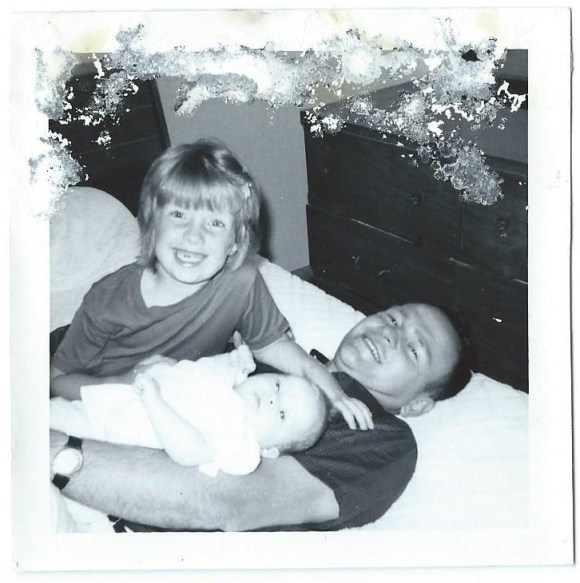I think about suicide all the time.
Every day.
But there’s no need to panic on my behalf and I’ll tell you why.
My father never took his grandkids fishing. He never helped them put together a homemade radio. He wasn’t there when I brought my adopted daughter home for the first time or when my son was born. He didn’t dance with me at my wedding, or snap photos at my graduation.
He never did any of these things, because when I was sixteen years old, he took his own life.
Since then, I’ve had a lot of time to think about the subject of suicide. About what he must’ve felt to make such a decision. About what that choice has meant for his friends and his family.

Robin Williams, Eva Rinaldi [CC BY-SA 2.0 (https://creativecommons.org/licenses/by-sa/2.0)%5D
Suicide leaves a lifetime seeded with landmines. For me, simple, well-meaning questions like, “Where do your parents live?” and “What does your dad do?” leave me with the heavy lifting of a painful truth.
My dad doesn’t do anything.
I rarely talk about it, and never bring it up on my own. When pressed, there is always that long awkward silence when I’m forced to brandish the grisly truth. People shift uncomfortably, not knowing what to say. I always used to wish I’d remembered to lie. “My dad? Oh, he’s retired. He has a condo in St. Augustine.”
But I can’t lie.
And I’m not going to hide.
As the author of a book that touches on the subject of teen suicide, I have been remiss in speaking about this publicly. Suicide is the third most common cause of death in young people. At the time I wrote HitList, it seemed I could hardly turn on the news without hearing of another tragic death: the burgundy-haired beauty with almond shaped eyes that was slut-shamed online. The ethereal boy who came out on Facebook, only to be harassed and bullied by his former friends.
I can’t imagine what it would be like to be the parent of one of those kids—to lose the person who matters most. In writing HitList, one of the things I hoped to do was show all faces of the tragedy, in order to encourage a dialogue and to discuss ways suicide might be prevented.
An editor at one of the big five publishers praised the writing in HitList, but declined to publish on the grounds adult readers might find suicide “unpalatable”. And it is. But denying the reality shuts down a dialogue. Because talking about suicide is an important step in preventing it. We cannot fix the things we deny, or prevent the things we refuse to discuss. Suicide is not a dark secret to be borne alone, but a real, preventable tragedy that is happening all the time. Every thirteen minutes someone commits suicide.
In the United States, September is National Suicide Prevention Awareness Month, a campaign to promote resources and awareness in suicide prevention. You can do your part by knowing the warning signs of suicide:
- A person threatens suicide, seems preoccupied with death or actively seeks out things that could be used in a suicide attempt.
- A person is suffering feelings of despondency or hopelessness, or makes statements like “I’m nothing but a burden” or “It’d be better if I was never born.”
- A person experiences a sudden change of behavior, for example, a period of depression is followed by a sudden sense of calm.
If you’re concerned about someone, reach out. While many people worry that broaching the subject of suicide might cause someone to be suicidal, in reality, talking openly can save a life. If you happen to be wrong, all you have done is shown the person how much you care. And if someone opens up to you about their pain, listen, be non-judgmental and do whatever you can to help them find the help they need.
My dad didn’t reach out and left no note. This was ages ago, in the midst of the 80s farm crisis and his small business relied on farmers. And it must’ve seemed futile and he must’ve felt like a failure. He never got to see that his business legacy survives to this day and his inventions and name live on.
Whatever it that got him to that point hardly matters now. And that’s the thing about life—it passes. Many of us—maybe most of us—have crashed against a wall of despair, failure, embarrassment or shame; suffered feelings of futility or overwhelming sadness, or gone through dark times of persistent hopelessness. But on the other side of that wall—and the other side is always there for those brave enough to climb it—is life. Sometimes punctuated with helpless laughter, footnoted with brief bouts of glory, occasionally boring, but faster than you realize—Life.
If you’ve lost someone you love to suicide, remember them today in love and kindness. And if you ever, Ever, EVER, EVER find yourself contemplating suicide, reach out. You matter more than you’ll ever know. Though the pain in your path may seem unbearable, you won’t know all that you can become if you don’t carry on.
I miss you, Dad.
Links:
American Foundation for Suicide Prevention: https://www.afsp.org/
Every Day Matters: http://www.everydaymatters.com/suicideprevention/
National Suicide Prevention Lifeline: http://www.suicidepreventionlifeline.org/
National Alliance on Mental Illness: https://www.nami.org/suicideawarenessmonth/hp
Call 1-800-273-TALK (8255) if you are in the US and need help now. To find a suicide helpline outside the U.S., visit IASP or Suicide.org.


It touches us all at some point in our short time here. The mystery of why some choose to make it even shorter remains unsolved.
LikeLiked by 1 person
Ahh, ((HUGS))…as someone who has family members who suffer from mental illness, depression and have tried to commit suicide, this post speaks volumes to me. It’s sometimes hard to put ourselves in their shoes and having a teen daughter who has gone through this and having months of psychotherapy, I know they see things in a different way than we do. And some of it is perception, some of it is feeling that hopelessness, of no self-worth…and it’s SO hard to fathom. Thank you for this post and sharing a piece of you. I know it must’ve been difficult.
LikeLiked by 1 person
Rebekah, thank you so much for your comment and your kindness and compassion. Hugs back. Thinking of you and your family.
LikeLike
I read this twice and cried both times. Thanks. I love you.
LikeLiked by 1 person
I love you too!
LikeLike
Karen, I have thought about your Dad many times over the years. I remember the canoe trip we all took once and the job he got us at the farm rouging beans that one summer (still one of my favorite summers!) He will always have a spot in my heart.
LikeLiked by 1 person
That is so sweet, thank you Lynda. I love to hear him remembered! That was a fun summer for sure 🙂
LikeLike
I am so sorry for your loss, Karen, for the times you never had with your dad, for the memories you never got to create. My sister died of suicide eight years ago, and though I enjoyed life with her for 60 years, I ache for the times we will not have. You’ve honored your dad and helped others with this post. Thank you.
LikeLiked by 1 person
Thank you Carol. I’m sorry for your loss.
LikeLike
This is a very brave post – and you’ve carried this burden for so many years now. My wife works a volunteer for the UK Samaritan organisation working with people in distress and trying to prevent suicides. Every caller has a different story and different needs but they are all stories which need to be told and listened to without judgement. And I’m pleased to see you’ve included a link to a mental health organisation – so important. I hope your post finds many readers.
LikeLiked by 1 person
Thank you Patrick! Kudos to your wife for her dedication to helping people. If you have any links you’d like to include for the UK that would be great 🙂
LikeLike
I cam very close three times. Stomach pump saved me the first time, which was the most serious. My Step Mother lost a 54-year-old son to suicide. Thanks for pointing out the reality and how to spot a potential suicide. Too often the despondent just close up and disappear. Add to that economic pressures, piss poor education among the minority and under-employed who get ignored in our city schools (according to not just what I heard on the NPR bit, but my own teaching experience) and this country may be in for a long spell of suicides or those mass shootings with suicides at the end….these are folks who needed a hug before it happened. I taught at a university in Korea for 7 years. The suicide rate among schoolchildren there is horrific. The pressure to be “#1” causes boys and girls alike to jump off buildings when they are mere #4 in a class of 300. Almost all of these happen in high school or middle school. not too many at the university level, but some very tragic ones when they do happen.
LikeLiked by 1 person
That is tragic about the kids in the Korea. So glad you are with us. Thanks for your comment and your honesty Doug. Schools, teachers and mental health services could all use some more support for sure.
LikeLike